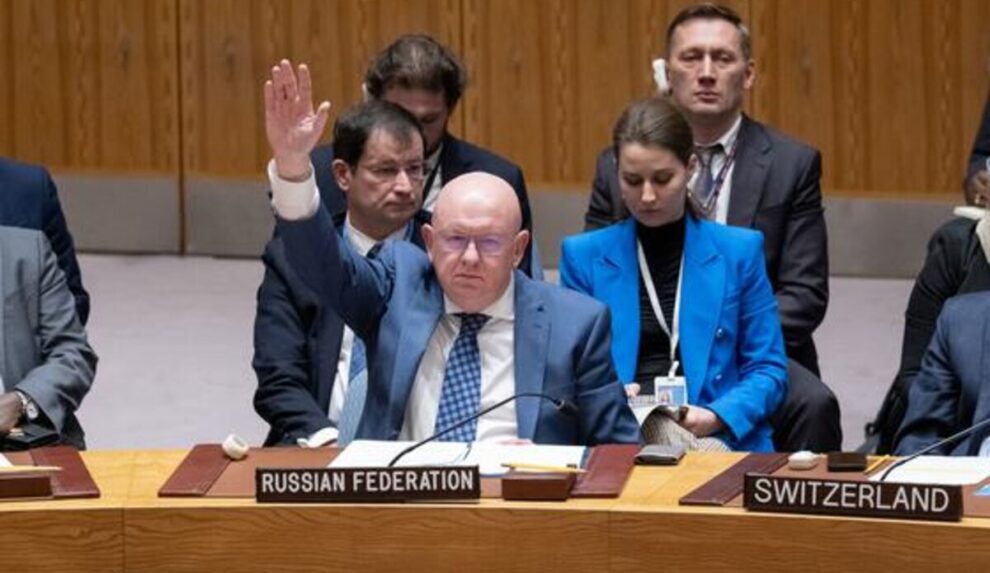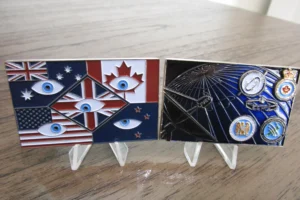The US-led draft resolution failed to pass owing to a negative vote by permanent Security Council members China and Russia.
Ten members of the Council voted for the draft resolution and three against (China, Russia and UAE), with two abstentions (Brazil and Mozambique).
A ‘no’ vote from any one of the five permanent members of the Council stops action on any measure put before it. The body’s permanent members are China, France, Russian Federation, the United Kingdom, and the United States.
Russian-backed resolution
A second draft resolution, led by Russia, was not adopted as it failed to secure sufficient number of votes in favour.
Four Council members voted in favour (China, Gabon, Russia and UAE), two against (UK and US), and nine abstained (Albania, Brazil, Ecuador, France, Ghana, Japan, Malta, Mozambique, Switzerland).
For a resolution to be adopted, it must be supported by at least nine members of the Council.
The proposed texts
The similarly worded resolutions would have called for a “humanitarian ceasefire” or “humanitarian pause” to enable safe delivery of aid for desperate civilians.
Both drafts condemned the terror attacks by Hamas on Israeli civilians of 7 October and urged action to address the worsening humanitarian crisis in the Gaza Strip, where fuel is due to run out for hospitals and other crucial services, in a matter of hours, according to UN agencies on the ground.
Key differences in the text included a specific mention in the US-backed proposal of States’ inherent right to self defence, and a call in the Russian-led one for the immediate cancellation by Israeli forces of the evacuation order for civilians to head into southern Gaza.
Draft resolutions do not represent the official position of the 15-member Security Council until adopted.
Some Council members spoke to state their positions ahead of the votes.
United States
US Ambassador Linda Thomas-Greenfield said the fruits of diplomacy have played out over the past few days, with humanitarian aid beginning to reach Gaza. The US will continue to work towards that effort, which is reflected in the draft resolution, she said.
Welcoming the release of four hostages by Hamas, she thanked Qatar and Egypt for their mediation. However, more than 200 hostages remain. “Parents lie awake at night wondering if they will ever see their children again,” she said, recalling her meeting on Tuesday with a family of one of the hostages.
“This moment is a test for all of us, for the international community and the Council,” she said. In drafting the resolution, “we listened, we engaged”, including with humanitarian agencies, and the draft contains language on deconfliction mechanisms to protect civilians and UN personnel.
However, Russia put forward a text with “zero consultations”, she said.
“The bottom line is this: Russia has offered up yet another resolution in bad faith,” she said, calling for support for the US draft, which condemns the heinous attacks by Hamas, confirms the right of Member States to self-defence and calls on parties to respect international humanitarian law.
It also calls for humanitarian pauses and indicates that Member States must take concrete steps to prevent the spread of the conflict.
“We must continue to work towards a future where two democratic states – Israel and Palestine – live side by side in peace,” she said, urging all Council members to vote in favour of the US draft.
Russia
Vassily Nebenzya, Russia’s Ambassador to the UN, said it was “extremely lamentable” that for two weeks since the crisis erupted, the Security Council has not been able to send a collective signal to deescalate the situation.
“The bloodshed is ongoing, the number of civilian causalities in now in the thousands [and] millions are displaced,” he said, urging a “hard think about the shocking figures.”
He recalled the earlier Russian proposal, a depoliticized resolution calling for a humanitarian ceasefire, which unfortunately was not supported by most members of the Council.
“National and narrow self-centred ideological and political interests prevailed over the aim of stopping a humanitarian disaster,” he said, noting also the US veto of the Brazilian-led resolution last week.
He went on to note that he saw no point in supporting the US-led draft that served the geopolitical interests of one of the Security Council members.
Concluding his statement, Mr. Nebenzya said he urged Council members to support the Russia-led text, stating: “This is the last attempt by the Council to fulfill the noble functions entrusted to it. We urge you not to miss it.”
Voting aftermath
US Ambassador Thomas-Greenfield expressed deep disappointment in the vetoing of the US resolution by China and Russia.
The US stands ready to work with all Member States to support the efforts of the UN Secretary-General, President Joe Biden and Secretary of State Antony Blinken, she said.
Expressing dismay after the Russian resolution fell, Ambassador Nebenzia regretted that once again, the Council had failed to respond to the unprecedented conflict in the Middle East.
US Representative Robert Wood said his delegation could not support the Russian draft, which did not reflect reality on the ground.
“We must put the region and the world above all else,” he said.
China
China’s Ambassador Zhang Jun said they had used their veto against the US resolution “based on facts, based on law, based on conscience, based on justice”.
He said in discussions the US text had emerged “seriously out of balance”, introduced in haste and lacking the strongest calls necessary for a full ceasefire.
He said China was fully in favour of taking action but accused the US text of being “evasive” on the key issue of ending the fighting.
Ceasefire is not only a diplomatic term, he added, it is a matter of life and death for many civilians.
“We would be irresponsible if we are ambiguous on the issue of war and peace”, said the Ambassador, stressing that China is not indifferent to the suffering of Gazans.
He said because the US text failed to mention the root causes of the current crisis in Gaza, without reference to Israel’s blockade or the evacuation order for civilians to move south, his country would be voting in favour of the Russian text.
He said the US effort if adopted, would completely end the possibility of a long term two-State solution to the Israel-Palestine conflict.
United Kingdom
UK Ambassador Barbara Woodward said through the US proposal, the Council could have condemned Hamas’ terrorist attacks. At the same time, Russia’s draft failed to recognize Israel’s right to self-defence.
“We are committed to work across the Council towards a balanced text,” she said, which should include a condemnation of Hamas, reaffirm Israel’s self-defence rights, protect civilians, and get more aid flowing into Gaza.
United Arab Emirates
The United Arab Emirates’ Ambassador Lana Zaki Nusseibeh said “the stakes are too high” and the Council “must step up”.
“We know what the most pressing humanitarian needs are,” she said, adding that these include a humanitarian ceasefire, release of all hostages, humanitarian access, fuel, water, and adherence to international humanitarian law.
Israel
Israel’s Ambassador Gilad Erdin said his country continues to be attacked, from north and south, and asked Council members how they would feel if faced with this reality.
“You would feel there is a blatant double standard,” he said, “and that the Council isn’t taking even the most basic steps anyone with a slight moral compass should take. This is precisely how the State of Israel feels right now.”
Israel has a right to self-defence, he said, adding that Hamas is solely responsible for Palestinian situation in Gaza and is committing crimes against humanity.
“In the wake of the Holocaust, we collectively swore ‘never again’”, he said. “This is one of the main reasons the UN was established. ‘Never again’, dear colleagues, is now. Do not forget this.”
Previous action
Last Monday, a previous Russian-led draft resolution calling for an “immediate humanitarian ceasefire” was voted down and the following Wednesday, the United States vetoed a Brazilian-led text that urged “humanitarian pauses” to deliver aid to millions in the Gaza Strip.
The UN Security Council held an open debate on the crisis on Tuesday, prompting more than 80 countries to make statements in the chamber on the worsening crisis between Israel and Palestine which threatens to destabilize the entire region and beyond.
Source: United Nations
















